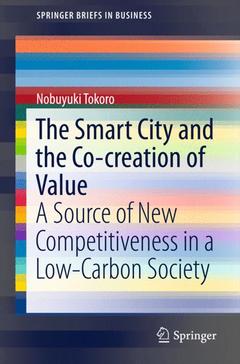The Smart City and the Co-creation of Value, 1st ed. 2016 A Source of New Competitiveness in a Low-Carbon Society SpringerBriefs in Business Series
Langue : Anglais
Auteur : Tokoro Nobuyuki

?The original point that differentiates this text from otherwise similar texts is that it looks at the building of smart cities from the viewpoint of an interchange of knowledge among companies in different industries, or ?Ba? as shared context in motion, and emphasizes that the resulting value becomes a source of new corporate competitive advantage. In recent years numerous publications have appeared that analyze smart cities from various perspectives including urban planning and administration, network theory, and innovation. However, few are academic texts that approach the subject from the viewpoint of corporate competitive advantage against a theoretical background in management studies, as this one does. This book is the first full-scale academic work to analyze smart cities from the viewpoint of corporate competitive advantage. Research into corporate competitive advantage includes the positioning and the resource-based views, with the former focusing on companies? external environment and the latter on their internal resources. Although these theories? foci of attention necessarily differ, they both developed as tools for analyzing companies? relative merits and their chances of succeeding in the marketplace, and they take the common premise that competitive advantage is built through competition among companies. In contrast, this book sees corporate competitive advantage as arising not through competition but through ?co-creation? among companies. It differs in its approach from existing theories in thinking that emphasizing co-creation over competition enables an analysis that better describes actual conditions when considering smart cities and corporate competitive advantage. Put another way, when new values arise from attempts to exchange and fuse knowledge, expertise, and other factors at the ?ba? where companies from different industries collaborate, these values are surely brought about through co-creation among companies. Another point regarding thisbook?s original perspective on competitive advantage is its emphasis on the relationship between the creation of social value and competitive advantage. The question of the extent to which socially useful values can be created in the markets of the 21st century is closely linked to corporate competitive advantage. The issues of building smart cities and corporate competitive advantage are themes that this perspective can firmly grasp. This book intends to take up three different projects from among the smart-city building developments taking shape in Japan, and undertake case studies based on the theoretical framework outlined above. The central themes will analyze the mechanism of co-creation among companies and the relationship of created value to competitive advantage. This analysis aims to demonstrate one model relating to corporate competitive advantage in the 21st century.
Chapter 1: Smart cities and competitive advantage: a new perspective on competitive edge.- Chapter 2: A Theoretical Framework for Relationship-based Strategies.- Chapter 3: Co-creation of Value Generated by a Self-motivated “Ba” - A Case Study of the Yokohama Smart Community.- Chapter 4: Co-creation of Value through Initiative of a Leader Company and Collaboration of Participating Companies - Case Study of Fujisawa Sustainable Smart Town.- Chapter 5: Co-creation of Value through Collaboration of Government and Companies - Case Study of the Yokohama Smart City Project.- Chapter 6: Theoretical and Managerial Implications.- Chapter 7: Conclusion.
Analyzes the building of smart cities from the viewpoint of co-creating value among companies in diverse industries Demonstrates one model of new competitive edge for companies in a low-carbon society Introduces the latest trends regarding the building of smart cities in Japan Includes supplementary material: sn.pub/extras
Date de parution : 11-2015
Ouvrage de 125 p.
15.5x23.5 cm
Thème de The Smart City and the Co-creation of Value :
© 2024 LAVOISIER S.A.S.



